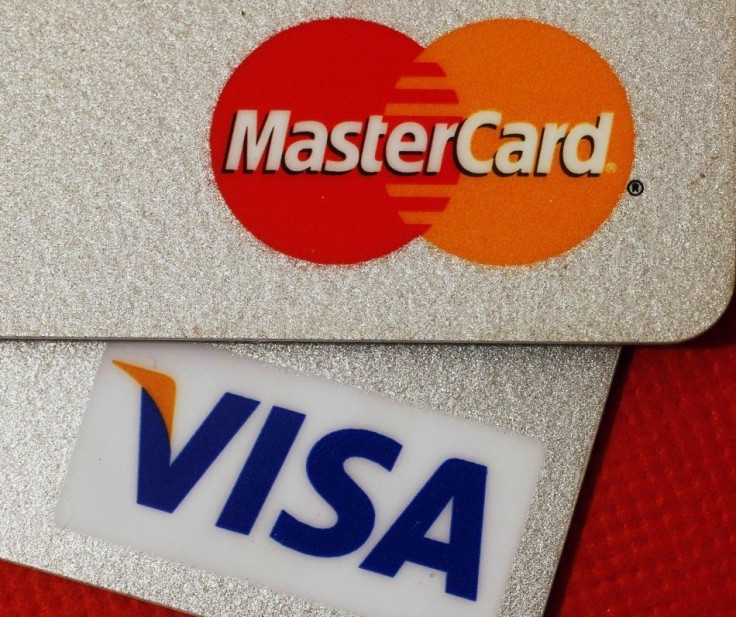Fed Issues Softer Durbin Rules: What Does It Mean For Visa, Mastercard?

The much-debated proposal to implement the Durbin amendment cap on debit-card interchange fees came in focus once again Wednesday as Fed raised the debit interchange rate cap to 21 cents.
The maximum permissible interchange fee that an issuer may receive for an electronic debit transaction will be the sum of 21 cents per transaction and 5 basis points multiplied by the value of the transaction.
The Fed also approved an upward adjustment of no more than 1 cent to an issuer's debit card interchange fee over fraud prevention costs.
As a result, a covered issuer eligible for the fraud-prevention adjustment could receive an interchange fee of up to about 24 cents for the average debit card transaction, which is valued at $38.
Meanwhile, the Fed surprised the market with 21 cent raise as the market expected the debit interchange rate cap to be bumped to 15 to 20 cents per transaction, compared to the 12 cents proposed in December.
The latest provision regarding debit card interchange fees is effective from October 1, 2011.
"The Fed decided for "Option A," the more lenient interpretation of the Durbin Amendment in that it negates "exclusivity" and forces competition only into Pin debit routing," Susquehanna Financial analyst James Friedman wrote in a note to clients.
The final rule prohibits all issuers and networks from restricting the number of networks over which electronic debit transactions may be processed to less than two unaffiliated networks. The effective date for the network exclusivity prohibition is April 1, 2012, with respect to issuers, and October 1, 2011, with respect to payment card networks.
In addition, issuers and networks are prohibited from inhibiting a merchant's ability to direct the routing of the electronic debit transaction over any network that the issuer has enabled to process them. The merchant routing provisions are effective on October 1, 2011.
Implications on Visa, Mastercard
The latest amendment would be beneficial for the leading payment technology firms Visa, Inc. (NYSE:V) and Mastercard (NYSE:MA).
Although the networks do not collect interchange, the moderated reductions likely allay concerns the banks will "clawback" fees paid to Visa and Mastercard.
"Fed's eagerly awaited final "Durbin rules" are a clear positive for V/MA," Jefferies analyst Jason Kupferberg said.
Meanwhile analyst Friedman expects modest 20 cents impact on Visa's 2012 earnings, which the brokerage expects at $5.21. Street expects Visa to earn $5.67 a share in 2012, according to analysts polled by Thomson Reuters.
For Mastercard, the numbers are likely more muted, Friedman said.
Friedman also said investors should now buy Visa.
"Investors should buy Visa now as the company will issue its first, post-Durbin guidance after market close on July 6: the revisions are likely more modest than the discounted multiple implies," the analyst noted.
"We believe the resolution of these issues will likely lift V shares, over time, towards our $92 price target," Friedman added.
What Next?
Now that the Fed has adopted final rules to limit debit-card interchange fees, the banks will quickly impose new fee structures on checking accounts and the debit cards attached to them.
"We expect banks to impose new checking account fee structures shortly after the Fed adopts final rules," Susquehanna Financial analyst David Hilder wrote in a note to clients.
The banking industry estimates that the higher fees banks will charge on checking accounts to recover lost debit-card revenue could push perhaps 5 percent of current bank customers out of the system and into the use of check-cashing stores and other nonbank financial services.
Recently, the chief financial officer of U.S. Bancorp estimated that it costs US Bancorp, one of the largest debit-card issuers and the most expense-efficient large bank, more than 30 cents to process each debit card transaction.
Meanwhile, major banks have been experimenting with higher monthly account maintenance fees, higher minimum balances to avoid fees, specific charges to have a debit card, or per-use charges for debit-card transactions.
For most banks, the revenue each major bank would have to recover per checking account on average to offset the 75 percent revenue loss comes in the range of $4 to $6 per month per checking account.
Averaged across 25 million to 35 million checking accounts for the very large banks, that is a lot of revenue to recover, but it seems that somewhere between 50 percent and 75 percent of that revenue can be recovered over time.
Sen. Dick Durbin pointed out repeatedly on the Senate floor on June 7, that about 50 percent of the entire banking industry's debit card revenue goes to Bank of America (NYSE:BAC), Wells Fargo (NYSE:WFC) and JPMorgan (NYSE:JPM).
© Copyright IBTimes 2024. All rights reserved.











